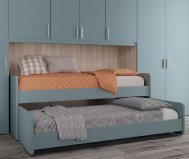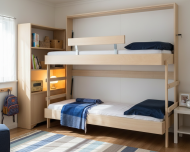Thanks to the Italian Government incentives, you can benefit from a 50% Irpef deduction for the purchase of furniture and large household appliances of class no lower than A+ (A or higher for ovens and washer-dryers).
What happens from a fiscal point of view?
The deduction is divided among those entitled in 10 equal annual instalments.
How can I benefit from these facilitations?
In order to benefit from the allowance, it is necessary that the date of the beginning of construction work is prior to the date on which the expenses for the purchase of furniture and large household appliances are incurred. The date of works commencement can be proved by any administrative authorisations or communications required by building regulations, by the prior communication to the ASL (indicating the date of commencement of works).
The amount of the expenses incurred for the purchase of furniture and large household appliances may also include the costs of transporting and assembling the goods purchased, provided the expenses were incurred with the payment methods required to benefit from the deduction.
What furnishings are covered by the deduction?
Kitchens, equipped walls, bathroom furniture, beds, wardrobes, chests of drawers, bookcases, desks, tables, chairs, bedside tables, sofas, armchairs, sideboards, as well as mattresses, etc.
What is needed to obtain the deduction?
To obtain the deduction, payments must be made by bank transfer, debit or credit card (to track the transaction) or even by financing! Furthermore, there must be a correspondence between the total amount paid and the amount of the relevant invoice. It is NOT permitted to pay by bank cheque, cash or other means of payment.
Who can benefit from tax deductions?
All taxpayers subject to personal income tax (Irpef), whether or not resident in the territory of the State, are eligible for the deduction. Therefore, if you have a job and reside in Italy, you can access the bonus. The bonus is available not only to the owners of the property but also to holders of real/personal rights of enjoyment over the property subject to the interventions and who bear the related expenses:
- owners or bare proprietors;
- holders of a right in rem of enjoyment (usufruct, use, dwelling or surface);
- tenants (leaseholders) or comodatari;
- members of divided and undivided cooperatives;
- individual entrepreneurs, for real estate not included among capital goods (investments that the company uses for its operation) or goods;
- persons indicated in Article 5 of the Tuir, who produce income in associated form (simple partnerships, general partnerships, limited partnerships and persons treated as such, family businesses), under the same conditions as those provided for individual entrepreneurs.







